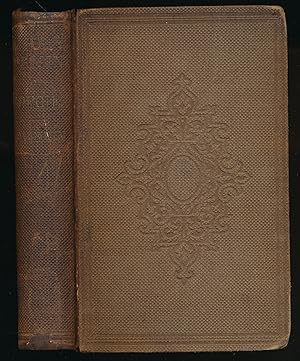on the origin of species, Prima edizione (113 risultati)
FeedbackFiltri di ricerca
Tipo di articolo
- Tutti i tipi di prodotto
- Libri (112)
- Riviste e Giornali (Nessun altro risultato corrispondente a questo perfezionamento)
- Fumetti (Nessun altro risultato corrispondente a questo perfezionamento)
- Spartiti (Nessun altro risultato corrispondente a questo perfezionamento)
- Arte, Stampe e Poster (1)
- Fotografie (Nessun altro risultato corrispondente a questo perfezionamento)
- Mappe (Nessun altro risultato corrispondente a questo perfezionamento)
- Manoscritti e Collezionismo cartaceo (Nessun altro risultato corrispondente a questo perfezionamento)
Condizioni
Legatura
Ulteriori caratteristiche
Lingua (2)
Spedizione gratuita
Paese del venditore
Valutazione venditore
-
On the Origin of Species by Means of Natural Selection, or the Preservation of Favoured Races in the Struggle for Life.
Editore: London: John Murray, 1859, 1859
Da: Peter Harrington. ABA/ ILAB., London, Regno Unito
Prima edizione Copia autografata
EUR 782.526,09
Convertire valutaEUR 16,36 per la spedizione da Regno Unito a U.S.A.Quantità: 1 disponibili
Aggiungi al carrelloFirst edition, presentation copy, inscribed on the front free endpaper in a secretarial hand, "Dr Weddell, Bagnères de Bigorre, from the author". This is a premier copy: Weddell is one of the earliest named recipients on Darwin's list of presentation copies. Darwin and Weddell, who had comparable experience as scientists aboard major expeditions to South America, exchanged findings, plant specimens, and presentation copies throughout their careers. Though born in England, Hugh Algernon Weddell (18191877) was raised in France and qualified as a physician there in 1841. He joined the Castelnau scientific expedition to South America the following year, aged 23, before leaving in 1845 to concentrate on his own plant collecting in the Andes. He returned to France in 1848, having discovered coca and cinchona, among other plants, and collected over 5,000 specimens. These travels and a later trip to Bolivia established him as a specialist in South American flora. He served as an assistant naturalist at the Muséum d'histoire naturelle in Paris from 1850 to 1857, before settling in Bagnères-de-Bigorre and later in Poitiers. Histoire naturelle des quinquinas ou monographie du genre (1849), the two-volume Chloris Andina (1855-57), and Monographie de la famille des Urticés (1856) are among his most noted publications. "Weddell was the first to demonstrate scientifically the medical importance of coca. as well as the dangers attached to its misuse. His work contributed to the cultivation of cinchona in the Dutch East Indies and other tropical regions, and earned him the Order of the Netherlands Lion in 1855, a rare distinction for a foreigner. His observations on the fossils of Tarija in Bolivia and on the different varieties of cinchona led him to elaborate, between 1850 and 1860, a theory of adaptation that anticipated Darwin, at least in France" (Natural History Museum). In 1858, Darwin and Hooker consulted the new data in Weddell's 1856 monograph to calculate the number of species and varieties in large and small genera. Weddell sent Darwin a copy of his paper on the Cynomorium plant in 1860, and two years later Darwin responded in kind by gifting Weddell a copy of Orchids, on page 19 of which he cites Weddell's work on the "naturally produced" hybrids of Aceras. Weddell is also included on Darwin's presentation list for "Two forms in species of Linum" (1863), which prompted a written correspondence on pollination mechanisms. In his letter of 13 May 1863 (DCP-LETT-4161), Weddell apologizes to Darwin for being unable to find the requested samples of Ophrys apifera (bee orchids) in his local area: "If at any future period I am more lucky, I shall not fail to observe a sufficient number of them as respects their manner of fertilisation and make you acquainted with the results". The final exchange between Darwin and Weddell concerned membership of the Académie des Sciences. Darwin applied twice to become a corresponding member of its botanical section, but it was not until after Weddell's death that the Académie offered the newly vacant place to him (DCP-LETT-11640A). Darwin drafted his list of recipients of presentation copies of the Origin between August and October 1859. Weddell appears on the first page of the list as "Dr. Weddell Bagneres de Bigorres Haute Pyrenees" (Correspondence Vol. 8, p. 555). "There are no known author's presentation copies of the first edition inscribed in Darwin's hand" (Norman). Subsequent provenance: Louis Devergne, likely the archpriest (1891-1941) at Loudon, some 40 miles from Poitiers where Weddell died, his neat ink ownership inscription on front free endpaper; private French collector. Freeman 373; Garrison-Morton 220; Horblit 23b; Norman 593; Printing and the Mind of Man 344b. "Appendix III - Presentation copies of Origin", in Frederick Burkhardt & James Second, eds, The Correspondence of Charles Darwin, Volume 8: 1860, 1993. Octavo. Folding diagram lithographed by W. West. 32-page publisher's catalogue at rear dated June 1859. Original green cloth, spine lettered and decorated in gilt (Freeman variant b, no priority), brown endpapers. Housed in a green quarter morocco solander box by the Chelsea Bindery. Extremities rubbed and bumped, cloth and gilt bright, small patch of dampstain at upper edge of rear cover with resulting area visible at gutter of rear endpapers, contents notably clean bar very occasional faint spotting and soiling, neatly repaired closed tear at fore edge of G5, tiny nick at fore edge of P5: a fine copy.
-
On the Origin of Species by Means of Natural Selection, or the Preservation of Favoured Races in the Struggle for Life.
Editore: John Murray, London, 1859
Da: Raptis Rare Books, Palm Beach, FL, U.S.A.
Prima edizione
EUR 361.869,72
Convertire valutaGratis per la spedizione in U.S.A.Quantità: 1 disponibili
Aggiungi al carrelloFirst edition of "certainly the most important biological book ever written" (Freeman), one of 1250 copies. Octavo, bound in original cloth, half-title, one folding lithographed diagram, without advertisements. In very good condition with cracks to inner hinges and a touch of shelfwear. Housed in a custom clamshell box. A fine example of this landmark work. Darwin ârevolutionized our methods of thinking and our outlook on the natural order of things. The recognition that constant change is the order of the universe had been finally established and a vast step forward in the uniformity of nature had been takenâ (PMM 344). âWithout question a watershed work in the history of modern life sciences, Darwinâs Origin elaborated a proposition that species slowly evolve from common ancestors through the mechanism of natural selection. As he himself expected, Darwinâs theory became, and continues to be in some circles, the object of intense controversyâ (American Philosophical Society). âThe five years [of Darwinâs voyage on the Beagle] were the most important event in Darwinâs intellectual life and in the history of biological science. Darwin sailed with no formal training. He returned a hard-headed man of science⦠The experiences of his five years in the Beagle, how he dealt with them, and what they led to, built up into a process of epoch-making importance in the history of thoughtâ (PMM).
-
On the Origin of Species by Means of Natural Selection, or the Preservation of Favoured Races in the Struggle for Life
Editore: John Murray, London, 1859
Da: James Cummins Bookseller, ABAA, New York, NY, U.S.A.
Prima edizione
EUR 316.636,01
Convertire valutaEUR 10,54 per la spedizione in U.S.A.Quantità: 1 disponibili
Aggiungi al carrelloFirst edition. First edition. Folding lithographic diagram facing page 117. [x], 502 pp.; 32 pp. [ads, dated June, 1859]. 8vo. Ushering in a new era of thought about the nature of man First edition of "the most influential scientific work of the 19th century" (Horblit) and "certainly the most important biological book ever written" (Freeman), in which Darwin explained his concept of evolutionary adaptation through natural selection, which would become the foundation of modern evolutionary theory; 1,250 copies were printed. "The publication of the Origin of Species ushered in a new era in our thinking about the nature of man. The intellectual revolution it caused and the impact it had on man's concept of himself and the world were greater than those caused by the works of Copernicus, Newton, and the great physicists of more recent times. Every modern discussion of man's future, the population explosion, the struggle for existence, the purpose of man and the universe, and man's place in nature rests on Darwin" (Mayr). Dibner 199; Freeman 373 (binding variant a, advertisements variant 3, no priority); Garrison-Morton 220; Horblit 23b; Norman 593; Printing and the Mind of Man 344b. Ernst Mayr, introduction to the Harvard University facsimile edition, Harvard University Press, 1964, pp. vii-xxviii Octavo gathered and signed in 12s. Original green diagonal-wave-grain cloth, spine lettered and decorated in gilt, covers ornamentally blocked in blind, pale brown coated endpapers, binder's ticket of Edmonds & Remnants to rear pastedown. Housed in a custom green cloth book-form slipcase and chemise. Folding diagram lithographed by W. West. 32-page publisher's catalogue at rear dated June 1859. Bookseller's description of a different copy tipped to front pastedown, marks of ownership as noted below. Spine slightly cocked, extremities rubbed, corners bumped, very short separation at foot of front joint, endpapers a trifle cracked at inner hinges, very lightly shaken with separation between signatures in a couple of places, a very good copy. Provenance: George Yewdall, solicitor, Leeds (blindstamp on front free endpaper); Sir Charles Fellows, British archaeologist (armorial bookplate on rear pastedown); John Edwin Eddison, professor of veterinary medicine (signature on front free endpaper); Sturges S. Dunham (signature, 29 June 1931, on front free endpaper verso) Folding lithographic diagram facing page 117. [x], 502 pp.; 32 pp. [ads, dated June, 1859]. 8vo.
-
On the Origin of Species
Editore: John Murray, London, 1859
Da: Magnum Opus Rare Books, Missoula, MT, U.S.A.
Prima edizione Copia autografata
EUR 248.785,43
Convertire valutaEUR 8,78 per la spedizione in U.S.A.Quantità: 1 disponibili
Aggiungi al carrelloHardcover. Condizione: Near Fine. 1st Edition. First Edition, First Printing SIGNED by Charles Darwin on an Autograph note signed in the third person "with Mr. Darwins compliments" laid into the book. The book is bound in the original green diagonal wave grain cloth, with the half-title a little trimmed and folding lithographed diagram present with advertisements at rear. This copy also has the First Issue point with 2 quotations facing the title page with "species" misspelled "speceies" on page 20, and the whale-bear story in full on page 184. The book has been re-cased preserving the original green cloth and brown endpapers. The binding is tight with NO cocking or leaning. The pages are clean with minor wear. A lovely copy SIGNED by the author housed in a custom clamshell slipcase for preservation. Signed by Author(s).
-
On the Origin of Species, True First Edition
Editore: John Murray, 1859
Da: CWO Books, Cleveland, OH, U.S.A.
Prima edizione
EUR 76.897,32
Convertire valutaEUR 4,39 per la spedizione in U.S.A.Quantità: 1 disponibili
Aggiungi al carrelloHardcover. Condizione: Very Good. 1st Edition. On the Origin of Species, Charles Darwin (1859), London, John Murray, TRUE FIRST EDITION, FIRST PRINTING. This copy is missing the half-title and title pages but has the two key First Issue points definitively identifying it as a true first printing: (1) species is misspelled "speceies" on page 20, and (2) the whale-bear story in full on page 184. See pics. Advertisements dated June 1859 at rear. Condition: In good to very good condition with some professional restoration work. Original pastedowns, with new front and rear endpages. Hinges reinforced. Pages clean and bright with little to no foxing. Boards retaining its deep green color. Slight spine lean. Comes in custom made clamshell case.
-
handwritten and signed association letter to Lady Dorothy Fanny Nevill by the author of 'On the Origin of Species'
Data di pubblicazione: 1861
Da: First and Fine, Ludlow, Regno Unito
Prima edizione Copia autografata
EUR 33.106,87
Convertire valutaEUR 32,73 per la spedizione da Regno Unito a U.S.A.Quantità: 1 disponibili
Aggiungi al carrelloNo Binding. Condizione: Fine. 1st Edition. Charles Darwin (1809-1882). Original handwritten and signed letter to Lady Dorothy Fanny Nevill; written on his Down, Bromley, Kent stationary, dated 27 November [1861]. One sheet, four pages, 8vo (203 x 127 mm), on a bifolium. In the letter Darwin thanks Lady Nevill for providing him with a plethora of orchids. Thanks to her help Darwin was aided in his efforts to write On the Various Contrivances by which British and Foreign Orchids are Fertilised by Insects [1862] in which he further gave evidence for the theory provided in the landmark 'On the Origin of Species [1859]. A lengthy letter in excellent condition with a beautiful signature and interesting content with direct link to his scientific work. Condition: in near fine condition with usual folding creases to fit an envelope. Content of the letter: A beautifull lengthy letter in which Darwin thanks Lady Nevill for her kindness and assistance in supplying him with plants, and mentioning his forthcoming work on orchids [On the Various Contrivances by which British and Foreign Orchids are Fertilised by Insects, published in 1862] which he had promised to send her when it was published. "I am pleased to hear that my Books have at all interested you; but I fear my little Orchid book will be dry. This summer when at the sea, I meant merely to write a paper for some scientific journal, but the subject grew on me till my M.S. got rather too long for a paper. I am convinced that orchids have a wicked power of witchcraft, for I ought all these months to be working at the dry old bones of poultry, pigeons, and rabbits instead of intensely admiring beautiful orchids. I mention all this, because, though I can hardly bear to write the words, I must beg your Ladyship not to send any more of your treasures; though perhaps at some future period I may indulge myself with the examination of a few more orchids. I will not forget your Ladyships most generous offer to give me other flowers, if I require them for observation, & I have no doubt that I shall some time be a beggar again of the beauties I am truly obliged to your Ladyship for taking the truth to write to Mr. Veitch [Chelsea nursery firm of James Veitch]; who has already sent me some orchids & with much generosity refused all payment for cut flowers. I see in 'Cottage Gardner' of this morning, an account of the beauties of Dangstein, which I shall now read with interest." Darwin also sends his regards to naturalist Arthur Edward Knox and paleontologist Sir Philip Egerton: "If your Ladyship should meet Mr [Arthur Edward] Knox I hope that you will remember me to him: I spent many years ago a very pleasant morning with him & Sir Philip Egerton at the Zoological Gardens" In a postscript he adds: "Since writing I have reason to hope that I shall receive a flower of Mormodes from Mr Rucker of Wandsworth". Lady Dorothy Fanny Nevill (1826-1913), the daughter of Horatio Walpole, 3rd Earl of Orford, developed a notable garden at Dangstein near Petersfield, where she cultivated orchids and pitcher-plants. Nevill was providing Darwin with samples of, and observations from, her garden. In Insectivorous Plants (1875) Darwin credited Lady Nevill with having sent him an Australian plant and a utricularia montana. In her Reminiscences, Nevill noted that she had maintained correspondence with Darwin, William Hooker, and Joseph Hooker, all of whom she felt had an avid interest in her garden Charles Dawrin needs no introduction. One of the most significant scientists of all time credited for his work on evolution and natural selection. Letters of such length and content rarely come up for sale. First and Fine. Signed by Author(s).
-
On the origin of Species By Means of Natural Selection. Or the Preservation of Favoured Races in the Struggle for Life
Editore: D. Appleton and Company, New York, 1860
Da: Magnum Opus Rare Books, Missoula, MT, U.S.A.
Prima edizione
EUR 20.355,17
Convertire valutaEUR 8,78 per la spedizione in U.S.A.Quantità: 1 disponibili
Aggiungi al carrelloHardcover. Condizione: Fine. 1st Edition. First Edition, First Printing. This is the First Issue of the American Edition. A beautiful copy. The book is bound in the ORIGINAL publisher's cloth with minor wear to the edges. The binding is tight with NO cocking or leaning and the boards are crisp with minor wear. The pages are clean with NO writing, marks or bookplates in the book. Overall, a wonderful copy of this First Edition in collector's condition. We buy Darwin First Editions.
-
On the Origin of Species by Means of Natural Selection or The Preservation of Favoured Races in the Struggle for Life.
Editore: D. Appleton and Company, New York, 1860
Da: Heritage Book Shop, ABAA, Beverly Hills, CA, U.S.A.
Prima edizione
EUR 16.736,47
Convertire valutaEUR 17,57 per la spedizione in U.S.A.Quantità: 1 disponibili
Aggiungi al carrelloFull Description: DARWIN, Charles. On the Origin of Species by Means of Natural Selection, or The Preservation of Favoured Faces in the Struggle for Life. New York: D. Appleton and Company, 1860. First American edition, first issue, with two quotations on the verso of the half-title. One of only 1,500 copies printed. Octavo (7 5/8 x 5 inches; 195 x 125 mm). 432 pp. Folding lithographed diagram (speciation tree) facing p, 108. Original dark brown bead-grain cloth with covers decoratively stamped in blind and spine ruled in gilt and blind and lettered in gilt. Original dark brown coated endpapers. A minor amount of foxing throughout. Page 70 with previous owner's marginal notes in red pencil. A small blindstamp to front flyleaf. Overall a near fine copy of the extremely scarce first issue of the first American edition. Housed in a custom black morocco clamshell. One of the most influential scientific works of the nineteenth century, On the Origina of Species was (and still is) one of the most controversial. In it "Darwin not only drew an entirely new picture of the workings of organic nature; he revolutionized our methods of thinking and our outlook on the natural order of things. The recognition that constant change is the order of the universe had been finally established and a vast step forward in the uniformity of nature had been taken" (Printing and the Mind of Man). Although published the same year as the second English edition, the text of the first American edition (with the two stereo reprints of the same year) is identical to the first English edition (Freeman 373), with the whale-bear story surviving intact. Freeman 377. Grolier/Horblit 23b ("the most influential scientific work of the nineteenth century") and Printing and the Mind of Man 344b (describing the 1859 first edition). HBS 68790. $18,500.
-
On the Origin of Species by Means of Natural Selection
Editore: John Murray, London, 1860
Da: Magnum Opus Rare Books, Missoula, MT, U.S.A.
Prima edizione
EUR 13.570,11
Convertire valutaEUR 8,78 per la spedizione in U.S.A.Quantità: 1 disponibili
Aggiungi al carrelloHardcover. Condizione: Fine. 1st Edition. Second edition, one of 3000 copies printed with 1860 date printed on the title page. The First Edition, First Printing has the 1859 date printed on the title page. A beautiful copy. The book is bound in the publisher's green cloth and is in excellent condition with slight wear to the edges. The binding is tight with NO cocking or leaning and the boards are crisp. The pages are clean with a nice previous owner name written to the inside front paste down. There is NO marks or bookplates in the book. A superb copy. We buy Charles Darwin First Editions.
-
The Works of Charles Darwin. Including: The Origin of Species; The Descent of Man; Variation of Plants and Animals Under Domestication; Formation of Vegetable Mould; The Effects of Cross and Self Fertilisation in the Vegetable Kingdom; The Movement and Habits of Climbing Plants; The Various Contrivances by Which Orchids are Fertilised by Insects. Second Edition, Revised. A Naturalist's Voyage. Journal of Researches into the Natural History and Geology of Countries Visited During the Voyage of the H.M.S Beagle; The Different Forms of Flowers on Plants of the Same Species.
Editore: D. Appleton and Company 1896-97, New York, 1896
Da: Raptis Rare Books, Palm Beach, FL, U.S.A.
Prima edizione
EUR 12.665,44
Convertire valutaGratis per la spedizione in U.S.A.Quantità: 1 disponibili
Aggiungi al carrelloThe Authorized edition of the works of Charles Darwin. Octavo, 15 volumes, bound in original three quarters morocco, gilt titles to the spine, top edge gilt, illustrated with in-text drawings and plates, some volumes with frontispieces. In near fine condition. An exceptional set. Charles Darwin has been widely recognized since his own time as one of the most influential writers in the history of Western thought. His books were widely read by specialists and the general public, and his influence had been extended by almost continuous public debate over the past 150 years. His most well known works are The Origin of Species, The Descent of Man and Voyage of the Beagle.
-
ON THE ORIGIN OF SPECIES By Means of Natural Selection
Editore: D. Appleton and Co: NY, 1860
Da: John K King Used & Rare Books, Detroit, MI, U.S.A.
Prima edizione
EUR 11.964,32
Convertire valutaEUR 4,83 per la spedizione in U.S.A.Quantità: 1 disponibili
Aggiungi al carrelloFolding chart, 8 x 5, pebbled greenish cloth, 432 pp with index, covers rubbed, extremities professionally repaired with matching green cloth, spine dull, inner hinges starting to crack, bookplates (front: Detroit architect Theodore Hinchman; rear: handwritten Detroit bookseller plate), first 16 pp insect damaged at lower fore corner, water stained at lower margins throughout, folding plate browned, contents toned with scatered spotting, couple of ink marks on p147 else a decent, collectible copy of the FIRST AMERICAN ED, FIRST STATE (with only two notices opposite title page).
-
On the Origin of Species by Means of Natural Selection, or the Preservation of Favoured Races in the Struggle for Life. Fifth Thousand. [Second Edition, Second Issue]. BRIGHT, FRESH COPY OF THE SECOND 'ORIGIN'
Editore: John Murray,, 1860
Da: Island Books, Thakeham, West Sussex, Regno Unito
Prima edizione Copia autografata
EUR 11.316,53
Convertire valutaEUR 20,10 per la spedizione da Regno Unito a U.S.A.Quantità: 1 disponibili
Aggiungi al carrello8vo., Fifth Thousand, [Second Edition, Second Issue], with folding diagram, neat contemporary signature in pencil at head of title, with second pencilled signature lower down, front free endpaper a little chafed at fore-edge, three or four small fox-spots each on half-title, title and diagram; original green cloth, boards elaborately blocked in blind, gilt back, , brown endpapers, uncut, expertly recased with original endpapers preserved, a remarkably bright, fresh copy in minimally restored publisher's binding. With 32pp publisher's catalogue (dated January, 1860) bound in at end, and the binder's ticket of Edmonds & Remnants on rear paste-down. The second edition, second issue is not so named on title but simply labelled 'Fifth Thousand'; Freeman records that 3000 copies were printed following the 1250 copies of the first edition. Although Darwin considered this edition a rapid revision to meet demand, his changes are much more than mere correction. 'The total number [of changes] in this edition is impressive enough. No chapter was untouched' (Peckham). The most famous alteration is the dilution of the whale bear passage on p.184, which Darwin later regretted although he never restored it. With the signed and ruled advertisements which Freeman considers the first issue. Freeman 113 variant a; Freeman F376.
-
On the Origin of Species by Means of Natural Selection, or the Preservation of Favoured Races in the Struggle for Life
Editore: D. Appleton and Company, New York, 1860
Da: Burnside Rare Books, ABAA, Portland, OR, U.S.A.
Prima edizione
EUR 11.308,43
Convertire valutaGratis per la spedizione in U.S.A.Quantità: 1 disponibili
Aggiungi al carrelloCondizione: Near Fine. First American Edition. First American edition, first printing, first issue with two quotes opposite the title page. 432 pp. Bound in publisher's green pebbled cloth decorated in blind, titles in gilt on the spine, original coated brown endpapers, folding chart intact. A Near Fine copy, expertly rebacked, light rubbing to cloth, small stain to edge, contemporary ownership inscription to front paste down and title page, light foxing and occasional offsetting to contents. An immensely influential work, considered to be the foundation of evolutionary biology, in which Darwin postulates that species evolve over the course of generations through natural selection.
-
ON THE ORIGIN OF SPECIES
Editore: Murray, 1860
Da: Jonkers Rare Books, Henley on Thames, OXON, Regno Unito
Arte / Stampa / Poster Prima edizione
EUR 10.233,03
Convertire valutaEUR 29,22 per la spedizione da Regno Unito a U.S.A.Quantità: 1 disponibili
Aggiungi al carrelloSecond edition, second issue as usual, dated 1860. Original publisher's green cloth, titled in gilt to the spine with blind stamped decoration to the covers, brown coated endpapers. 32pp of adverts dated January 1860. A near fine copy, clean and bright with just trivial wear to the spine ends and a light vertical crease. Internally fresh, hinges tight with a stain around the top of the hinges. Minor loosening between sections G and H, otherwise tight. A very well preserved copy. Single fold-out diagram. Almost universally regarded as the most important scientific book of the nineteenth century. "Darwin not only drew an entirely new picture of the workings of organic nature; he revolutionised our methods of thinking and our outlook on the natural order of things. The recognition that constant change is the order of the universe had been finally established and a vast step forward in the uniformity of nature had been taken" (PMM). For the second edition, "The misprint 'speceies' is corrected and the whale-bear story diluted, an alteration which Darwin later regretted, although he never restored the full text" (Freeman). Freeman 374, PMM 344b (first edition).
-
On the origin of Species By Means of Natural Selection. Or the Preservation of Favoured Races in the Struggle for Life
Editore: D. Appleton and Company, New York, 1860
Da: Magnum Opus Rare Books, Missoula, MT, U.S.A.
Prima edizione
EUR 9.951,42
Convertire valutaEUR 8,78 per la spedizione in U.S.A.Quantità: 1 disponibili
Aggiungi al carrelloHardcover. Condizione: Fine. 1st Edition. First Edition, First Printing with two quotations facing title page instead of three. A wonderful copy bound in the publisher's embossed brown cloth with gilt titles on the spine with restoration to the spine. The book has the original brown endpapers with light wear to the spine and boards. The pages are clean with NO writing, marks or bookplates in the book. A lovely copy.
-
On the Origin of Species by Means of Natural Selection, or the Preservation of Favoured Races in the Struggle for Life.
Editore: John Murray, London, 1860
Da: Raptis Rare Books, Palm Beach, FL, U.S.A.
Prima edizione
EUR 9.951,42
Convertire valutaGratis per la spedizione in U.S.A.Quantità: 1 disponibili
Aggiungi al carrelloRare second edition, second issue, in Freeman's binding variant "a" of Darwin's magnum opus. Freeman 376; Norman 594. Octavo, original publisher's green cloth. In excellent condition with the spine gilt bright, contemporary owner's signature to the title, marginalia on pages 72 and 132. A nice example. Darwin ârevolutionized our methods of thinking and our outlook on the natural order of things. The recognition that constant change is the order of the universe had been finally established and a vast step forward in the uniformity of nature had been takenâ (PMM 344). âWithout question a watershed work in the history of modern life sciences, Darwinâs Origin elaborated a proposition that species slowly evolve from common ancestors through the mechanism of natural selection. As he himself expected, Darwinâs theory became, and continues to be in some circles, the object of intense controversyâ (American Philosophical Society). âThe five years [of Darwinâs voyage on the Beagle] were the most important event in Darwinâs intellectual life and in the history of biological science. Darwin sailed with no formal training. He returned a hard-headed man of science⦠The experiences of his five years in the Beagle, how he dealt with them, and what they led to, built up into a process of epoch-making importance in the history of thoughtâ (PMM). Darwin wrote in his diary that all 1250 copies of the first edition, published on November 24, were sold on the first day; however, more accurately, nearly all of the edition had been sold to the trade immediately, with the exception of personal copies set aside for Darwin and review copies.
-
On the origin of species by means of natural selection, or the preservation of favoured races in the struggle for Life
Editore: London: John Murray, 1860
Da: B & B Rare Books, Ltd., ABAA, New York, NY, U.S.A.
Prima edizione
EUR 8.594,41
Convertire valutaEUR 10,54 per la spedizione in U.S.A.Quantità: 1 disponibili
Aggiungi al carrelloHard Cover. Condizione: Near Fine. First Edition. Second edition, second issue (with "fifth thousand" on title page), one of only 3000 copies and yet the largest printing of any edition or issue in Darwin's lifetime, and the last English edition to contain the whale-bear story. Folding lithographed plate, 32pp. of publisher's advertisements at rear. Original publisher's green cloth, covers stamped in blind, gilt spine. About near fine, with just a touch of wear to spine ends, rear hinge faintly cracked but secure, binding slightly shaken at signatures in rear but sturdy overall, cloth bright and clean, interior with a bit of spotting but generally very clean and fresh, table at pp. 116-7 with a tear at fold. Overall, a superb copy in original cloth. Freeman 376. Darwin's On the Origin of Species is the basis for all of evolutionary biology. It includes evidence from Darwin's journey aboard the HMS Beagle, including data on the famous finches from the Galapagos Islands. First published in November 1859 with only 1,170 copies for sale, the book sold out in a single day. Just six weeks later, this second edition was printed, which contained many corrections and alterations. One of the biggest changes Darwin made was to a section on the hypothetical evolutionary relationship between whales and bears that had been misinterpreted by some and used to criticize the book and Darwin's theory. Darwin also made alterations to the book's conclusion to diffuse outrage from religious figures. He adds the sentence "I see no good reason why the views given in this volume should shock the religious views of anyone" and references a letter from author and clergyman Charles Kingsley, of The Water-Babies fame, in which Kingsley praises Darwin and says that his theory poses no threat to his personal religious beliefs. Additionally, in the final sentence of the book, Darwin incorporates a reference to "the Creator.".
-
On the Origin of Species by Means of Natural Selection, or the Preservation of Favoured Races in the Struggle for Life
Da: Jonathan A. Hill, Bookseller Inc., New York, NY, U.S.A.
Prima edizione
EUR 8.458,70
Convertire valutaEUR 17,57 per la spedizione in U.S.A.Quantità: 1 disponibili
Aggiungi al carrelloFolding lithographed diagram. 8vo, orig. pale green cloth (head & foot of spine with slightest chipping, occasional unimportant foxing), covers stamped in blind, spine lettered in gilt. New York: D. Appleton, 1860. First American edition, "second issue" with three quotations on verso of half-title. A very good and bright copy preserved in a slip-case. ? Freeman 378. For the first edition, see Horblit 23b; Dibner, Heralds of Science, 199; and Printing & the Mind of Man 344b.
-
ON THE ORIGIN OF SPECIES BY MEANS OF NATURAL SELECTION, or the Preservation of Favoured Races in the Struggle for Life
Editore: London John Murray 1861, 1861
Da: Buddenbrooks, Inc., Newburyport, MA, U.S.A.
Prima edizione
EUR 7.811,86
Convertire valutaEUR 10,98 per la spedizione in U.S.A.Quantità: 1 disponibili
Aggiungi al carrelloA very early issuance and only the third edition (seventh thousand of the title, with important additions and corrections] of Darwin's monumental work. This edition is printed in the same format and binding as the first edition, and includes "An Historical Sketch of the Recent Progress of Opinion on the Origin of Species" in which Darwin acknowledges his fellow scientists as regards the theory of evolution, as well as a table of corrections to the first and second editions. Two-thousand copies only were printed and issued in April 1861. Folding lithographed diagram by W. West. Quarto in 12's (7 3/4" x 5 7/8", 193mm x 124mm), publisher's original green cloth, gilt decorated on the spine and blocked in blind on the covers, salmon glazed paper end-leaves with the binders Edmonds & Remnants ticket on the rear paste-down. Housed in a handsome morocco labeled slipcase with chemise. i-v vi-xix, 538, [2] ads. and with one folding plate. A very fresh and clean copy, fine and very bright both internally and externally with only very light evidence of age or use. The end-leaves in excellent condition and unusually clean, the hinges strong and pleasing and without refurbishment, a slight bit of rubbing only at the extremities. An especially pleasing copy, unusually well preserved. One of the best we have seen. AN ESPECIALLY HANDSOME AND PLEASING COPY OF THIS GREAT BOOK. THE THIRD AND HIGHLY IMPORTANT ISSUANCE OF CHARLES DARWIN'S MASTERWORK. The book is rare in cloth in this condition. Darwin's Revolutionary Masterwork, in which he not only "drew an entirely new picture of the workings of organic nature; he revolutionized our methods of thinking and our outlook on the natural order of things. The recognition that constant change is the order of the universe had been finally established and a vast step forward in the uniformity of nature had been taken." [PMM) Together with Copernicus' DE REVOLUTIONIBUS and Newton's PRINCIPIA, it is deemed one of the three greatest and most important scientific works ever penned. "The most influential scientific work of the nineteenth century" and "The most important biological work ever written" (Horblit, Freeman). Darwin's elaboration of the theory of natural selection laid the groundwork for the controversy over the evolution of man, and with only slight modification by such scientists as Stephen Jay Gould, Darwin's ideas remain the umbra under which most current biological research is conducted. The import of the ORIGIN need hardly be stated. This edition, for the first time contains Darwin's historical treatment of theories of evolution: "An Historical Sketch of the Recent Progress of Opinion on the Origin of Species" (xiii-xix). Here Darwin acknowledges the impact of Lamarck, Patrick Matthew and others, right up to 1860, on his thought. As such, it is the first edition that situates Darwin in his broader intellectual context. Copies of the ORIGIN are often quite worn, but the present item is unusually well preserved, bright, clean, tight and especially handsome. The book was, if ever used, handled very kindly indeed. Darwin had intended the book to be an abstract of his 'big book' on transmutation, of which only the first part (Variation Under Domestication, 1868) was published in his lifetime.
-
O Proischozhdenii Vodov. [Russian: On the Origin of Species]. Perevel c anglijskago [translated from English by] S.A. Rachinsky. - ["THE MOST IMPORTANT BIOLOGICAL BOOK EVER WRITTEN" (FREEMAN)]
Da: Herman H. J. Lynge & Søn ILAB-ABF, Copenhagen, Danimarca
Prima edizione
EUR 7.578,13
Convertire valutaGratis per la spedizione da Danimarca a U.S.A.Quantità: 1 disponibili
Aggiungi al carrelloS.-Peterburg, 1864. 8vo. Bound in a beautiful recent pastiche-binding of brown half calf with marbled papers over boards and elegant gilding to spine. End-papers renewed. A few dampstains and a bit of brownspotting throughout. A nice copy. XIV, 399, (1) pp. + 1 plate. First edition of the first Russian translation of Darwin's "Origin of Species", a main reason for the widespread effect of Darwinism in Russia, where the theory met less resistance in the 1860'ies than it did in Western Europe. In Russia, Darwinism had a profound influence not only upon the different sciences, but also on philosophy, economic and political thought, and the great literature of the period. For instance, both Tolstoy and Dostoevsky referenced Darwin in their most important works, as did numerous other thinkers of the period."In 1864, S.A. Rachinsky, professor of plant physiology at St. Petersburg University, produced the first Russian translation of the "Origin". Although not a masterpiece of translation art, the book sold out so quickly that in 1865 it went through a second printing. By this time Darwin's ideas were discussed not only by scientists but also by such popular writers as Dmitri Pisarev and M. A. Antinovich." (Glick, p. 232). Rachinsky began translating the "Origin" in 1862 and wrote an important article on the theories presented in it, while working on the translation. This article and the translation of the "Origin" into Russian were responsible for the great success and rapid, widespread knowledge of Darwinian theory of evolution in Russia. "Darwin was concerned that the "Origin of Species" reach naturalists across the world, but translations of that complicated work raised problems for Darwin. If he found it difficult to make the reader "understand what is meant" in England and America, at least in those two countries he and the reader were discussing the "Origin of Species" in the same language. Foreign language editions raised not only the thorny question of translating Darwinian terms, but also the problem of translators, who often thought it proper to annotate their editions to explain the "significance" of Darwinism. The first Russian translation of the "Origin of Species" (1864) appeared, however, without any comment whatever by the translator, Sergei A. Rachinsky, professor of botany at the University of Moscow. Rachinsky had begun the translation in 1862 and published an article on Darwinism while continuing work on the translation in 1863." (Rogers, p. 485). In the year of publication of the translation, 1864, Pisarev wrote a long article in "The Russian Word", which purports to be a review of this translation" the critic complains about the absence of notes and commentaries by the translator. Pisarev furthermore points to several errors in the translation and to numerous infelicities of expression. Acknowledging the importance of the work, however, and of the spreading of Darwinism in Russia, he goes on in his own essay to provide a much more popular account of Darwin's theory and to impress upon his readers its revolutionary significance.Nikolai Strakhov also reviewed the translation immediately upon publication, acknowledging the effect it would have. Strakhov, however, recognized potential dangers inherent in the theory and expressed them in his review of Rachinsky's translation. He praised the work for its thoroughness and rejoiced in the evidence that man constituted the highest stage of organic development" but then he went on to argue that by moving into questions of philosophy and theology, the Darwinists were exceeding the limits of scientific evidence. Like Pisarev, Tolstoy enthusiastically embraced Darwinism. "The first mention of Darwin in Tolstoy's literary "Nachlass" is found in one of the drafts to "War and Peace". There Darwin is listed, apparently quite favorably, among leading thinkers "working toward new truth" [.] Thus by the late 1860's the name of Darwin as a leading scientist was already familiar to Tolstoy and duly respected." (McLean, p. 160). A fact which is often overlooked is that Tolstoy actually knew Rachinsky quite well. Interestingly, it was in a letter to Rachinsky, in reply to a question about the structure of "Anna Karenina", that Tolstoy made the famous statement (that all Tolstoy scholars and lovers know by heart): "I am proud of the architecture - the arches are joined in such a way that you cannot discover where the keystone is". Like Strakhov, however, Dostoevsky, acknowledging the significance of the "Origin", saw the dangers of the theory. In the same year as the publication of Rachinsky's translation, he lets the narrator in "Notes from Underground" (1864) launch his attack on Darwinism , beginning: "As soon as they prove you, for instance, that you are descended from a monkey, then it's no use scowling, you just have to accept it."In "Crime and Punishment" (two years later, 1866) the Darwinian overtones inherent in Raskolnikov's theory of the extraordinary man are unmistakable. He describes the mechanism of "natural selection," where, according to the laws of nature, by the crossing of races and types, a "genius" would eventually emerge. In general, Darwinian themes and Darwin's name occur in many contexts in a large number of Dostoevsky's works.Freeman: 748. See: James Allen Rogers: The Reception of Darwin's Origin of Species by Russian Scientists. In: Isis, Vol. 64, No. 4 (Dec., 1973), pp. 484-503.Thomas F. Glick: The Comparative Reception of Darwinism. 1974.Hugh McLean: In Quest of Tolstoy. 2008.
-
On the Origin of Species by Means of Natural Selection, or The Preservation of Favoured Races in the Struggle for Life
Data di pubblicazione: 1860
Da: John Windle Antiquarian Bookseller, ABAA, San Francisco, CA, U.S.A.
Prima edizione
EUR 7.192,16
Convertire valutaGratis per la spedizione in U.S.A.Quantità: 1 disponibili
Aggiungi al carrelloNew York: D. Appleton and Company, 1860. 8vo, (7 5/8 x 5 inches; 195 x 125 mm). 432 pp. Folding lithographed diagram (speciation tree) facing p. 108. Original dark green bead-grain cloth with covers decoratively stamped in blind and spine ruled in gilt and blind and lettered in gilt. Original dark brown coated endpapers, front free endpaper removed; early ink signature J.F. Oakes dated 186 (8?); boookplate of Isador H. Coriat and stamp of Edmund Brill with inscription. Professionally conserved: hinges strengthened, head and foot of backstrip renewed. § First issue of the first American edition. One of the most influential scientific works of the nineteenth century, "On the Origin of Species" was (and still is) one of the most controversial books ever printed. In it "Darwin not only drew an entirely new picture of the workings of organic nature; he revolutionized our methods of thinking and our outlook on the natural order of things. The recognition that constant change is the order of the universe had been finally established and a vast step forward in the uniformity of nature had been taken" (Printing and the Mind of Man). Although published the same year as the second English edition, the text of the first American edition (with the two stereo reprints of the same year) is identical to the first English edition (Freeman 373), with the whale-bear story surviving intact. Freeman 377. Grolier/Horblit 23b ("the most influential scientific work of the nineteenth century"). Printing and the Mind of Man 344b (describing the 1859 first edition).
-
ON THE ORIGIN OF SPECIES
Editore: D. Appleton, New York, 1860
Da: Kubik Fine Books Ltd., ABAA, Dayton, OH, U.S.A.
Prima edizione
EUR 6.785,06
Convertire valutaEUR 6,15 per la spedizione in U.S.A.Quantità: 1 disponibili
Aggiungi al carrelloHardcover. 1st American Edition. FIRST PRINTING OF THE AMERICAN EDITION OF ONE OF THE MOST INFLUENTIAL BOOKS IN HUMAN THOUGHT. 1st state of Darwin's classic, with two reviews facing the title page. Original brown pebbled cloth, stamped in blind. Restoration work to spine - this book was professionally rebacked, preserving most of the original spine which was laid down over newer brown cloth. The original brown coated paper endpapers were preserved. Although the repiar is visible, it was expertly done and the two cloths blend together nicely. The interior of the book is clean with only some minor foxing to the first and final few leaves. Two signatures in pencil of former owners, one of whom was E.L. Moseley, a noted Ohio teacher who founded the Science Department at Bowling Green State University. Housed in a custom open-ended slipcase. AN ATTRACTIVE COPY OF THE FIRST AMERICAN EDITION OF A MAJOR BOOK. Darwin's influence on modern thought is of lasting and sigificant importance.
-
On the origin of species by means of natural selection
Editore: New York: D. Appleton, 1860
Da: Antiquarian Scientist, The, Westhampton, MA, U.S.A.
Membro dell'associazione: SNEAB
Prima edizione
EUR 6.785,06
Convertire valutaEUR 7,90 per la spedizione in U.S.A.Quantità: 1 disponibili
Aggiungi al carrelloHardcover. Condizione: Near Fine. No Jacket. 1st Edition. DARWIN, CHARLES (1809-82). On the origin of species by means of natural selection. New York: D. Appleton, 1860. FIRST AMERICAN EDITION, first issue with the required two quotations facing the title. 8 vo. Original brown pebbled cloth, the original spine skillfully remounted, with very closely matching pebbled cloth for nearly imperceptible new hinges. Orig. brown endpapers and book block edges preserved. 432 pp. A folding lithographed plate. Upper corners of covers a bit worn, but cloth otherwise fresh. Early circular embossed stamp in blank area of title: "S.C. Griggs & Co., PublishersChicago." A nearly fine, crisp copy. The scarce first issue of the first American edition "of the most important biological book ever written" (Freeman). The official publication date of the Murray edition was November 24, 1859, while the Appleton edition appeared at New York on January 10, 1860. "By observing the special biology and geology of isolated islands during the cruise of the 'Beagle', Darwin's reflective mind saw, in the struggle for existence, that favourable variations would tend to help survival, with the resulting formation of new species. Fossil remains and the extinction of species, such as the dodo and solitaire birds, further supported such a position. This, the most important single work in science, brought man to his true place in nature." (Heralds of Science 199 - citing first edition). Freeman 377 & p.83.
-
[On The Origin of Species.] A fajok eredete a természeti kiválás útján vagyis az elönyös válfajok fenmaradása a létérti küzdelemben. Irta Charles Darwin. Az eredeti hatodik bövitett s javitott kiadása után fordította Dapsy László. Revideálta Margó Tivadar. I. [II.] kötet
Editore: Kiadja a Természettudományi Társulat Könyvkiadó Vállalata, Budapest, 1873
Prima edizione
EUR 6.600,00
Convertire valutaEUR 19,50 per la spedizione da Ungeria a U.S.A.Quantità: 1 disponibili
Aggiungi al carrelloFirst Hungarian edition. First Hungarian edition. In publisher's green cloth, bound into two volumes, gilt-stamped spine titles, panels with blindstamped device. 2 v. XIV, [2], 303, [1] p. and 1 folding plate; VII, [1], 361, [3] p., and a plate with Darwins portrait, protected with tissue paper. First Hungarian edition of Darwin's opus magnum, the On the Origin of Species (1859), the foundation of evolutionary biology. A fajok eredete was Darwin's first book to be translated into Hungarian. The translator László Dapsy (1843-1890) was a gymnasium teacher in Budapest, who studied at the New College in The University of Edinburgh. While in Scotland Dapsy was introduced to Darwin's scientific theories, and back in Hungary, he became a pioneer advocate of Darwinism. As a member of the Hungarian Society of Natural Sciences Dapsy urged the publication of Darwin's works in Hungarian and translated the present book, On the Origin of Species. While working on the text, he was in correspondence with Darwin who, besides authorized the publication, provided the photograph after which the portrait, illustrating this edition, has been made. The translation was revised by another progressive Hungarian scientist and early Darwinist Tivadar Margó (1816-1896), who was the author of the first Hungarian zoological book based on Darwin's theories, and the first biography of Darwin written in Hungarian. Margó held the memorial lecture after Darwin's death at the Hungarian Academy of Science of which Darwin was an honorary fellow since as early as 1872, wherein he recollected the memories about his personal encounter with Darwin in 1875. Provenance: Ownership stamp of Dr. János Garán (1847?-1911), country doctor in Székelyhíd (today: SÄcueni, Romania). Scarce, WorldCat locates seven complete copies, worldwide, of which only two are held in the US (Huntington; NLM) . Contemporary ownership signature on half-titleOccasional light foxing throughout in both volumes. Overall in fine condition In publisher's green cloth, bound into two volumes, gilt-stamped spine titles, panels with blindstamped device.
-
On the Origin of Species
Editore: D. Appleton and Company, New York, 1860
Da: Ernestoic Books, Clarence, NY, U.S.A.
Prima edizione
EUR 5.880,38
Convertire valutaEUR 4,39 per la spedizione in U.S.A.Quantità: 1 disponibili
Aggiungi al carrelloFirst American edition, first printing, first issue with only two reviews facing the title page. Measuring approximately 8" x 5.25", with 432 numbered pages. This book is in good plus condition. Moderate surface wear with some cloth loss at the spine ends. Some fading to the gilt lettering on the spine. Moderate foxing to the edges of the textblock. Interior pages lightly foxed. Top of the half-title and title pages neatly trimmed by a previous owner (likely to remove previous owner's name). Front endpaper nearly detached. "On the Origin of Species" is considered to be the foundation of evolutionary biology. Darwin's book introduced the scientific theory that populations evolve over the course of generations through a process of natural selection. The book presented a body of evidence that the diversity of life arose by common descent through a branching pattern of evolution. Please view the many other rare titles available for purchase at our store. We are always interested in purchasing individual or collections of fine books. Inventory #(O2-74). First American Edition, First Printing, First Issue.
-
O Proischozhdenii Vodov. [Russian: On the Origin of Species]. Perevel c anglijskago [translated from English by] S.A. Rachinsky. - ["THE MOST IMPORTANT BIOLOGICAL BOOK EVER WRITTEN" (FREEMAN)]
Da: Herman H. J. Lynge & Søn ILAB-ABF, Copenhagen, Danimarca
Prima edizione
EUR 5.786,94
Convertire valutaGratis per la spedizione da Danimarca a U.S.A.Quantità: 1 disponibili
Aggiungi al carrelloS.-Peterburg, 1864. 8vo. Bound in a beautiful half calf recent pastiche-binding with marbled papers over boards and elegant gilding to spine. End-papers renewed. Stamp to half-title, title-page and first leaf of text. First leaves evenly browned and dampstain to outer margin affecting last 50 ff. A few occassional brownspots throughout. XIV, 399, (1) pp. + 1 plate with genealogical tree (between pp. 92/93). First edition of the first Russian translation of Darwin's "Origin of Species", a main reason for the widespread effect of Darwinism in Russia, where the theory met less resistance in the 1860'ies than it did in Western Europe. In Russia, Darwinism had a profound influence not only upon the different sciences, but also on philosophy, economic and political thought, and the great literature of the period. For instance, both Tolstoy and Dostoevsky referenced Darwin in their most important works, as did numerous other thinkers of the period."In 1864, S.A. Rachinsky, professor of plant physiology at St. Petersburg University, produced the first Russian translation of the "Origin". Although not a masterpiece of translation art, the book sold out so quickly that in 1865 it went through a second printing. By this time Darwin's ideas were discussed not only by scientists but also by such popular writers as Dmitri Pisarev and M. A. Antinovich." (Glick, p. 232). Rachinsky began translating the "Origin" in 1862 and wrote an important article on the theories presented in it, while working on the translation. This article and the translation of the "Origin" into Russian were responsible for the great success and rapid, widespread knowledge of Darwinian theory of evolution in Russia. "Darwin was concerned that the "Origin of Species" reach naturalists across the world, but translations of that complicated work raised problems for Darwin. If he found it difficult to make the reader "understand what is meant" in England and America, at least in those two countries he and the reader were discussing the "Origin of Species" in the same language. Foreign language editions raised not only the thorny question of translating Darwinian terms, but also the problem of translators, who often thought it proper to annotate their editions to explain the "significance" of Darwinism. The first Russian translation of the "Origin of Species" (1864) appeared, however, without any comment whatever by the translator, Sergei A. Rachinsky, professor of botany at the University of Moscow. Rachinsky had begun the translation in 1862 and published an article on Darwinism while continuing work on the translation in 1863." (Rogers, p. 485). In the year of publication of the translation, 1864, Pisarev wrote a long article in "The Russian Word", which purports to be a review of this translation" the critic complains about the absence of notes and commentaries by the translator. Pisarev furthermore points to several errors in the translation and to numerous infelicities of expression. Acknowledging the importance of the work, however, and of the spreading of Darwinism in Russia, he goes on in his own essay to provide a much more popular account of Darwin's theory and to impress upon his readers its revolutionary significance.Nikolai Strakhov also reviewed the translation immediately upon publication, acknowledging the effect it would have. Strakhov, however, recognized potential dangers inherent in the theory and expressed them in his review of Rachinsky's translation. He praised the work for its thoroughness and rejoiced in the evidence that man constituted the highest stage of organic development" but then he went on to argue that by moving into questions of philosophy and theology, the Darwinists were exceeding the limits of scientific evidence. Like Pisarev, Tolstoy enthusiastically embraced Darwinism. "The first mention of Darwin in Tolstoy's literary "Nachlass" is found in one of the drafts to "War and Peace". There Darwin is listed, apparently quite favorably, among leading thinkers "working toward new truth" [.] Thus by the late 1860's the name of Darwin as a leading scientist was already familiar to Tolstoy and duly respected." (McLean, p. 160). A fact which is often overlooked is that Tolstoy actually knew Rachinsky quite well. Interestingly, it was in a letter to Rachinsky, in reply to a question about the structure of "Anna Karenina", that Tolstoy made the famous statement (that all Tolstoy scholars and lovers know by heart): "I am proud of the architecture - the arches are joined in such a way that you cannot discover where the keystone is". Like Strakhov, however, Dostoevsky, acknowledging the significance of the "Origin", saw the dangers of the theory. In the same year as the publication of Rachinsky's translation, he lets the narrator in "Notes from Underground" (1864) launch his attack on Darwinism , beginning: "As soon as they prove you, for instance, that you are descended from a monkey, then it's no use scowling, you just have to accept it."In "Crime and Punishment" (two years later, 1866) the Darwinian overtones inherent in Raskolnikov's theory of the extraordinary man are unmistakable. He describes the mechanism of "natural selection," where, according to the laws of nature, by the crossing of races and types, a "genius" would eventually emerge. In general, Darwinian themes and Darwin's name occur in many contexts in a large number of Dostoevsky's works.Freeman 748. See: James Allen Rogers: The Reception of Darwin's Origin of Species by Russian Scientists. In: Isis, Vol. 64, No. 4 (Dec., 1973), pp. 484-503.Thomas F. Glick: The Comparative Reception of Darwinism. 1974.Hugh McLean: In Quest of Tolstoy. 2008.
-
On the Origin of Species
Editore: D. Appleton and Company, 1860
Da: Night Heron Books, Laramie, WY, U.S.A.
Prima edizione
EUR 5.428,05
Convertire valutaEUR 3,73 per la spedizione in U.S.A.Quantità: 1 disponibili
Aggiungi al carrelloHardcover. Condizione: Good. 1st Edition. This is a first American edition second state from 1860. Three Reviews. Some staining to pages and spine. Some light damage to edges. P/O's name on first page, otherwise, No Markings to text. Happy to provide more pictures or answer in questions!
-
On the Origin of Species by Means of Natural Selection Or the preservation of favoured races in the struggle for life.
Editore: D. Appleton and Company, New York, 1860
Da: Heritage Book Shop, ABAA, Beverly Hills, CA, U.S.A.
Prima edizione
EUR 5.428,05
Convertire valutaEUR 17,57 per la spedizione in U.S.A.Quantità: 1 disponibili
Aggiungi al carrelloFull Description: DARWIN, Charles. On the Origin of Species by Means of Natural Selection, or the preservation of favoured races in the struggle for life. New York: D. Appleton and Company, 1860. First American edition, third issue. "Revised Edition" on title-page and three quotations to verso of half-title. Octavo (7 11/16 x 4 7/8 inches; 196 x 125 mm). [1]-432 pp. With folding chart. Original pebbled brown cloth with covers decoratively stamped in blind. Spine lettered in gilt. Green-coated endpapers. A very slight bit of fraying to top and bottom of the spine. Spine lightly sunned. Previous owner's pencil signature on front free endpaper. And an old ink gift inscription dated 1895 on front flyleaf. Some intermittent light foxing. Housed in a custom full black morocco clamshell. Overall a very good unrestored copy. One of the most influential scientific works of the nineteenth century, On the Origin of Species was (and still is) one of the most controversial. The book caused an uproar immediately upon its publication, and many early copies were burned in protest of its author's ideas. In it "Darwin not only drew an entirely new picture of the workings of organic nature; he revolutionized our methods of thinking and our outlook on the natural order of things. The recognition that constant change is the order of the universe had been finally established and a vast step forward in the uniformity of nature had been taken" (Printing and the Mind of Man). Although published the same year as the second English edition, the text of the first American edition (with the two stereo reprints of the same year) is identical to the first English edition (Freeman 373), with the whale-bear story surviving intact. Freeman 376 ("the most important biological book ever written"). Grolier/Horblit 23b ("the most influential scientific work of the nineteenth century"); Printing and the Mind of Man 344b (first edition). Freeman, Darwin, 379. Printing and the Mind of Man 344. HBS 68677. $6,000.
-
The Selected Works. [Journal of Researches (on) the Voyage of HMS Beagle; The Structure and Distribution of Coral Reefs; Geological Observations; The Origin of Species (2 vols); The Variation of Animals and Plants Under Domestication (2 vols); The Descent of Man; The Expression of the Emotions in Man and Animals; Insectivorous Plants; The Different Forms of Flowers on Plants of the Same Species; The Power of Movement in Plants; The Formation of Vegetable Mould Through the Action of Worms; The Life and Letters, Edited by his Son Francis Darwin (2 vols).]
Editore: New York: D. Appleton and Company, 1896-97, 1896
Da: Peter Harrington. ABA/ ILAB., London, Regno Unito
Prima edizione
EUR 4.815,55
Convertire valutaEUR 16,36 per la spedizione da Regno Unito a U.S.A.Quantità: 1 disponibili
Aggiungi al carrelloThe Authorized edition, uncommon complete with the publisher's half morocco bindings in bright and attractive condition. The American publisher Appleton made the first serious attempt towards a uniform collection, an idea that was most comprehensively achieved nine decades later under the imprint The Pickering Masters (1986-9). There was no collected edition published during Darwin's lifetime. Together 12 works in 15 vols, octavo. Illustrated with photographic half-tone plates, folding maps, line drawings, and diagrams. Original red half morocco, spines lettered in gilt, marbled sides, top edges gilt, other edges uncut, some leaves unopened. Modern colour photograph of a Victorian woman loosely inserted in Descent of Man. A couple of spines lightly darkened, bright overall, wear to upper corners of Different Forms of Flowers, contents clean, p. 189 folding map in Geological Observations inadvertently bound so as to be unopenable, tears from previous attempts to open neatly repaired. A near-fine set.
-
On The Origin of Species
Editore: D. Appleton & Co, New York, 1860
Da: The Chatham Bookseller, Madison, NJ, U.S.A.
Prima edizione
EUR 4.523,37
Convertire valutaGratis per la spedizione in U.S.A.Quantità: 1 disponibili
Aggiungi al carrelloHardcover. Condizione: Very Good. First American Edition. 432pp. First American edition, first issue with two quotes opposite the title page.Gilt lettering on the spine is darkened. Spine professionally rebacked, the original spine present. , Bound in pebbled brown cloth, brown endpapers, and the foldout chart is present and in excellent condition. The corners of the front panel show moderate wear. Prev. owner's name in pencil on the front free endpaper and the title page. The hinges are tight, and the text block is clean. Overall a very well preserved copy of this classic work. Darwin's theory argued that organisms gradually evolve through a process he called natural selection. In natural selection, organisms with genetic variations that suit their environment tend to propagate more descendants than organisms of the same species that lack the variation, thus influencing the overall genetic makeup of the species. Size: Octavo.



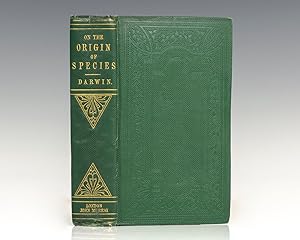

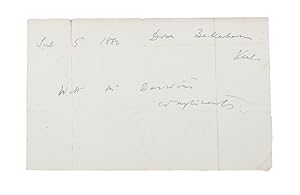

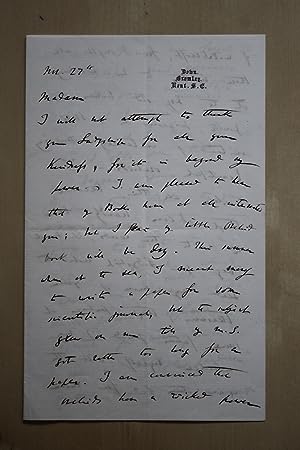
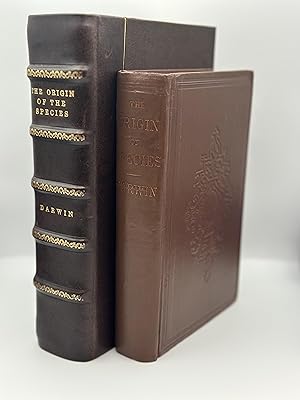
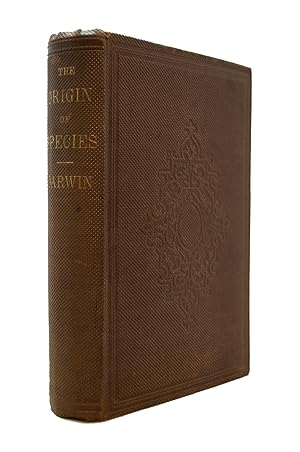
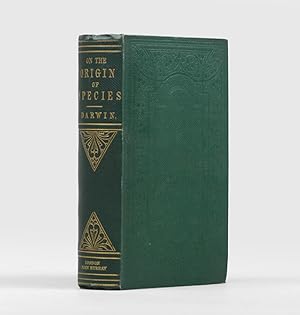
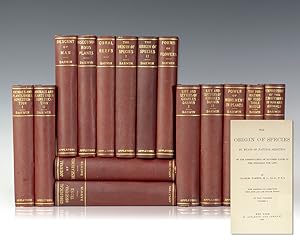
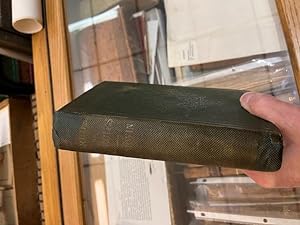
![Immagine del venditore per On the Origin of Species by Means of Natural Selection, or the Preservation of Favoured Races in the Struggle for Life. Fifth Thousand. [Second Edition, Second Issue]. BRIGHT, FRESH COPY OF THE SECOND 'ORIGIN' venduto da Island Books](https://pictures.abebooks.com/inventory/md/md16658886175.jpg)
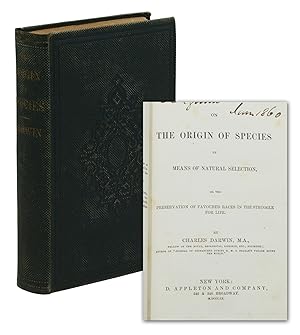
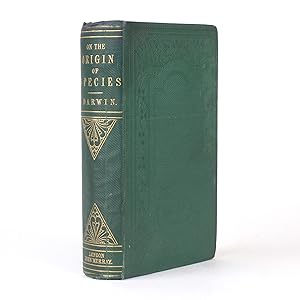

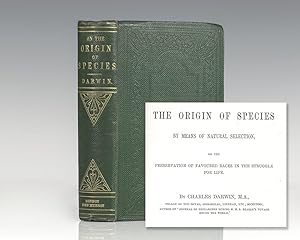
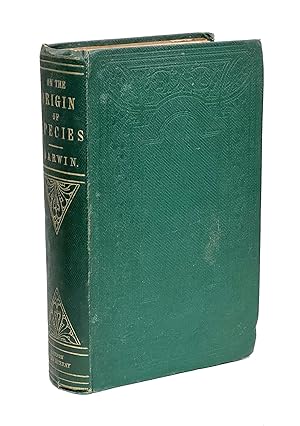
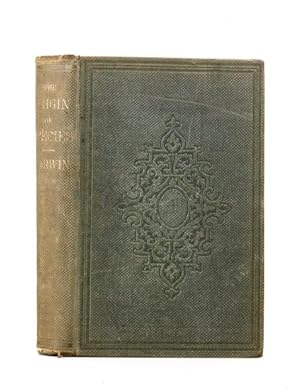

![Immagine del venditore per O Proischozhdenii Vodov. [Russian: On the Origin of Species]. Perevel c anglijskago [translated from English by] S.A. Rachinsky. - ["THE MOST IMPORTANT BIOLOGICAL BOOK EVER WRITTEN" (FREEMAN)] venduto da Herman H. J. Lynge & Søn ILAB-ABF](https://pictures.abebooks.com/inventory/md/md30095148565.jpg)

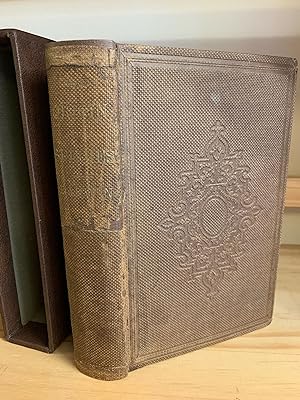
![Immagine del venditore per [On The Origin of Species.] A fajok eredete a természeti kiválás útján vagyis az elönyös válfajok fenmaradása a létérti küzdelemben. Irta Charles Darwin. Az eredeti hatodik bövitett s javitott kiadása után fordította Dapsy László. Revideálta Margó Tivadar. I. [II.] kötet venduto da Földvári Books](https://pictures.abebooks.com/inventory/md/md30752094465.jpg)
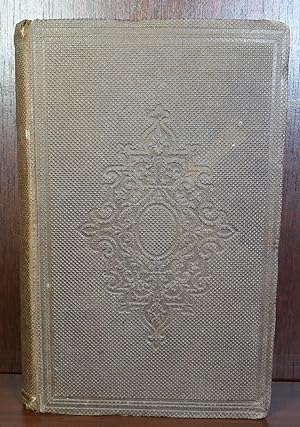
![Immagine del venditore per O Proischozhdenii Vodov. [Russian: On the Origin of Species]. Perevel c anglijskago [translated from English by] S.A. Rachinsky. - ["THE MOST IMPORTANT BIOLOGICAL BOOK EVER WRITTEN" (FREEMAN)] venduto da Herman H. J. Lynge & Søn ILAB-ABF](https://pictures.abebooks.com/inventory/md/md31775512474.jpg)
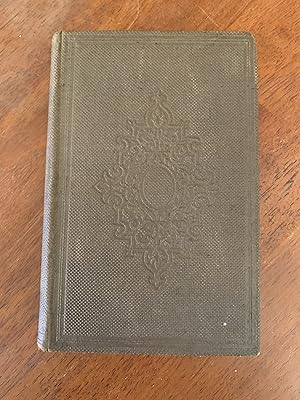
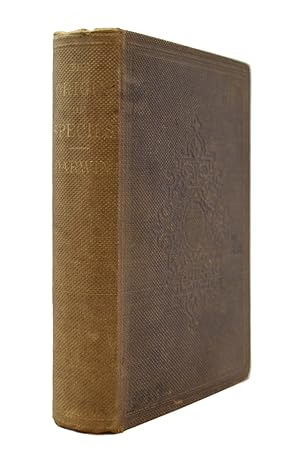
![Immagine del venditore per The Selected Works. [Journal of Researches (on) the Voyage of HMS Beagle; The Structure and Distribution of Coral Reefs; Geological Observations; The Origin of Species (2 vols); The Variation of Animals and Plants Under Domestication (2 vols); The Descent of Man; The Expression of the Emotions in Man and Animals; Insectivorous Plants; The Different Forms of Flowers on Plants of the Same Species; The Power of Movement in Plants; The Formation of Vegetable Mould Through the Action of Worms; The Life and Letters, Edited by his Son Francis Darwin (2 vols).] venduto da Peter Harrington. ABA/ ILAB.](https://pictures.abebooks.com/inventory/md/md31954103836.jpg)
